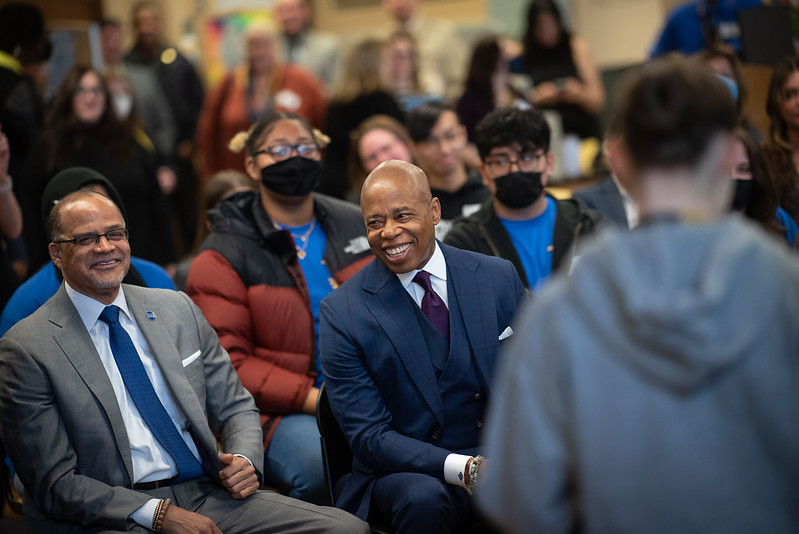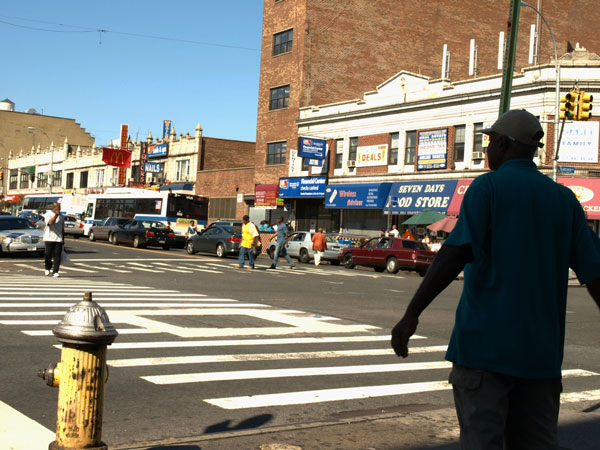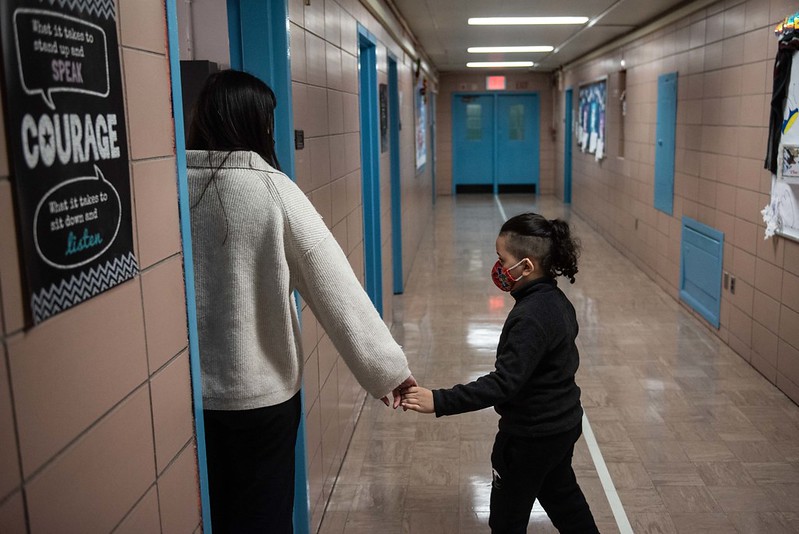How ‘Gifted and Talented’ Shows the Failures of One Man Rule of Our Schools

Mayor Adams and Chancellor Banks (photo: Michael Appleton/Mayoral Photography Office)
Last week, community school districts across New York City submitted their plans for the schools chancellor’s new, unimaginative Gifted and Talented program. Last month, the Department of Education announced that superintendents would work with local Community Education Councils to determine the sites for third grade G&T programs in their districts. While Chancellor David Banks, with support from Mayor Eric Adams, who appointed him, has claimed to value “authentic parent, family, and community engagement,” the reality on the ground is quite different — a return to top-down, authoritarian education politics.
G&T programs took root in New York City in the 1970s, largely to create a separate learning track for white, middle-class families. Lacking specialized curriculum, or specialty-trained teachers, the lure of most G&T programs is that students will be educated in more homogeneous classrooms — classrooms with few to no Black or Latino children, Black or Latino teachers, children in temporary housing, children with disabilities, English language learners, or children in foster care. Over the last several years, a number of schools and districts have phased out G&T programs in an effort to desegregate classrooms.
One of the highest-performing districts in New York CIty, Brooklyn’s District 15, began phasing out G&T programs in favor of the Schoolwide Enrichment Model several years ago following a large-scale community engagement process. Yet, Chancellor Banks does not seem to be allowing districts to opt out of third-grade G&T, undoing years of progress, and seemingly ignoring the role that G&T programs play in cementing racial segregation in our schools.
Since the State Legislature granted the New York City Mayor full control of our schools two decades ago, every mayor has tinkered with G&T policy. A political lightning rod issue, each administration attempts to make G&T a little less racist without antagonizing the white middle class families that the program was created to serve.
Mayor Bloomberg centralized G&T admissions, moving from admissions hinging on IQ tests and teacher recommendations to admissions being based on standardized test scores. At the time, the city was under investigation by the Civil Rights Office of the U.S. Department of Education, and data clearly indicated G&T programs did not enroll proportionate numbers of Black and Latino children. Not surprisingly, standardized test-based admissions reduced the number of Black and Latino students further and eventually led to some districts phasing out G&T programs completely due to lack of enrollment.
Despite his rhetoric about undoing the tale of two cities, Mayor de Blasio continued testing four-year-olds for Kindergarten G&T (a practice not supported by education experts) and initiated new third-grade G&T programs in districts that did not offer them (Districts 7, 12, 16, and 23). These programs admitted students based on teachers’ evaluations of second-graders. His political anxiety about overhauling G&T ran so deep that he attempted to continue the testing of four-year-olds in the midst of the pandemic. This failed only because the City Board of Education (a.k.a. Panel for Educational Policy) voted down the contract for the testing company, citing the gross racial inequities that would have been exacerbated under his plan.
After the Panel for Educational Policy voted to reject the G&T testing contract in January 2021, Mayor de Blasio, in his last months in office, finally began the planning process for reimagining G&T. After a series of community engagement events, the mayor and Department of Education unveiled “Brilliant NYC,” which would have replaced G&T programs with the school-wide enrichment model. We were relieved to see the DOE moving in the right direction. But this was short-lived.
While the politicians tinker with G&T policy under the pretense of “education reform,” our children and our schools suffer. I am a father of four children, both former and current public school students. All my children have had or still have Individual Education Plans and the youngest has dyslexia, requiring a great deal of advocacy. I have been a community leader in Bedford-Stuyvesant for decades and have served on the Community Education Council District 16 since 2014.
In my district, Bloomberg’s G&T policies resulted in the loss of its lone program. Parents and community leaders advocated for years to bring back the program until in 2016 Schools Chancellor Carmen Fariña announced the creation of a third-grade G&T program in my district without parent input. This too failed, in large part because families were unwilling to uproot students to attend a new school in third grade, particularly when the school was farther away.
As a community leader, I am angered by the detrimental effects of G&T in my community, and the unwillingness of political leaders to confront the problem head-on. We have been advocating for a high quality program in our district for years. When Chancellor Fariña implemented the third grade G&T program in my district, we urged the DOE to properly resource the program with teachers certified in G&T and professional development. Yet, resources did not come with the new program, which was one of the reasons for its failure. We then began advocating for the school-wide enrichment model as well as more investment in our schools to right the historical disinvestment. To date, there is no indication that the DOE is making real investment in my community.
Historically, G&T programs in less affluent neighborhoods, like Bed-Stuy and Brownsville, were thrown together to create the appearance of fairness, while never receiving the resources and support needed for successful implementation.
For over a year, I sat on the School Diversity Advisory Group convened by Mayor de Blasio, whose recommendations included replacing G&T with the school-wide enrichment model to give every student an enriched education. More than two years later, although flawed, the former mayor and his Department of Education announced the “Brilliant NYC” plan, which resulted in a lengthy set of recommendations to replace G&T with universal enrichment. But it was announced with so little time before the end of de Blasio’s tenure that he could not implement it and Mayor Adams scrapped it.
Seemingly ignoring the complexity of issues surrounding G&T, Mayor Adams and Chancellor Banks announced the program's expansion instead. Citywide, their grand vision will impact about three kindergarteners and about 30 third-graders in each district, continuing to build on the legacy of separate and unequal schools in New York City.
I question how this expansion can be promoted as ending “the era of scarcity” or aligns with any of the four pillars of Chancellor Bank’s educational framework. Labeling a small group of students “gifted and talented” does not “reimagine the student experience” (pillar one) for the remaining 95% of students and will continue to instill a sense of inferiority in those not selected for G&T. Expanding a program that has failed in District 16 is not “scaling, sustaining and restoring what works” (pillar two). We need resources for all our students in District 16 to address the traumas of the pandemic and increase in violence due to decades of disinvestment in my community exacerbated by all COVID-19 has wrought.
Expansion of G&T is not “prioritizing wellness and its link to student success” (pillar three). Finally, disrespecting my community’s position is not “empowering families to be our true partners” (pillar four).
To my community, which has suffered from historical disinvestment, the G&T expansion is an example of yet another mayor claiming to know what is good for my community. It is another piece of evidence that mayoral control of the school system must end.
Central Brooklyn was the center of the movement to establish “community control” of schools in the 1960s. The movement was very much about empowering Black Brooklyners for self-determination in education. We will not settle for a few more crumbs thrown our way to quiet us and will continue to fight until every child has a whole loaf of bread. The State Legislature must create a school governance system that shares responsibilities and accountability with parents. We are tired of hearing empty promises that are nothing more than PR soundbites. Our children cannot wait any longer.
***
NeQuan C. McLean is President of the Community Education Council District 16 in Bedford-Stuyvesant and President of the Education Council Consortium, a non-profit organization to empower historically marginalized parents. On Twitter @NequanMclean.
***
Have an op-ed idea or submission for Gotham Gazette? Email This email address is being protected from spambots. You need JavaScript enabled to view it.
The DEC Must Approve National Grid’s Permits at Greenpoint Energy Center

A business strip in Queens (photo: NYCUrbanScape/FlickR)
New York’s leaders are pushing for an energy transition to get more from renewable sources but in the meantime it is imperative that people can heat and light their homes and businesses.
A critical decision that will affect the supply of energy in New York City is sitting with the New York State Department of Environmental Conservation (DEC) right now and has been delayed several times.
National Grid’s Greenpoint Energy Center has supplied safe, reliable and affordable energy to New Yorkers throughout the city for more than 50 years. To meet customers’ energy needs in the winter, natural gas supplied to the facility is liquified on-site and stored during low-demand periods in two storage tanks. During the coldest days of the year or when other sources of fuel are disrupted by extreme weather, National Grid vaporizes the stored liquified natural gas (LNG) and distributes it to customers through its network. This does not happen often, in fact just a few days each of the last two years, but when it does it is critically important to keeping New Yorkers warm.
Currently, the combined output of the existing vaporizers at the Greenpoint Energy Center is insufficient to meet the forecasted peak demand for upcoming winters. National Grid is therefore seeking approval from the state to construct and operate two new LNG vaporizers that will increase efficiency, allowing reliable, affordable service to continue for all New Yorkers while also decreasing greenhouse gas emissions and pave the way to a fossil-free heating system.
The New York Public Service Commission (NYPSC) found that there are no other viable, short-term solutions that would take the place of the Greenpoint Energy Center, meaning it is essential for National Grid to maintain safe and reliable gas service.
The new vaporizers will allow the facility to operate more efficiently and cleanly than the equipment currently being used. According to an independent analysis, this will allow National Grid to meet rising demand for heat while reducing greenhouse gas emissions in line with the state’s Climate Leadership and Community Protection Act (CLCPA).
As New York recovers from the COVID-19 pandemic and our economy continues to grow, it is critical that our leaders work with our utilities to provide consistent, dependable service for residents and businesses. As we rebuild our businesses, we need infrastructure that can keep pace to support the development and expansion of small and large businesses across the region. The Greenpoint facility’s need is a key, common-sense solution to meet the demands of our economy and put us back on solid footing.
A very small but vocal minority of New Yorkers say that we should avoid any further investment in our existing energy infrastructure, even if it does cut emissions. They would rather see moratoriums on new hook-ups and leave New Yorkers in the lurch in the middle of the cold winter until enough renewable energy supply comes online decades from now. These voices are loud, but they do not represent the interests of the vast majority of New Yorkers.
Most New Yorkers understand that neglecting our infrastructure will put us at risk of dangerous outcomes that could disproportionately impact older people and disadvantaged communities. Instead, we should be taking smart steps to reduce emissions and ensure reliable service on our path to a clean energy future.
On behalf of the Queens business owners and residents I represent in my role as Chamber of Commerce President, and the millions of other New Yorkers who believe in taking smart action to address climate change, I urge the DEC to approve National Grid’s applications for permits so that this critical project can move forward and we can continue down the path to a green and prosperous New York.
***
Thomas J. Grech is the President & CEO of the Queens Chamber of Commerce, which has over 1,400 members representing more than 150,000 Queens-based employees. On Twitter @QueensChamber.
***
Have an op-ed idea or submission for Gotham Gazette? Email This email address is being protected from spambots. You need JavaScript enabled to view it.
We Need a Comprehensive Education Plan to Get Our Children Back on Track

Helping students recover (photo: Michael Appleton/Mayoral Photography Office)
“Have you been reading to your child and teaching them about letters daily? Ever since the pandemic, we have seen a delay in letter recognition and this is a very important skill for kindergarten children.”
This is what was conveyed to each of us individually when we brought our children to tutors to assess whether they were on track to learn to read. As working mothers who engage with schools on a daily basis, it was very difficult for us to admit that our kids were what are now called ‘pandemic babies.’ Unfortunately, their learning was gravely impacted by school closures, mask mandates, and the lack of basic normalcy over the past two years.
It is now known that the average child lost four months of learning in math and reading during the pandemic. Schools across the country are now reporting with regularity children of all socioeconomic backgrounds who are emotionally immature and cognitively delayed and lacking in basic motor and behavioral skills. Even more disturbing are the learning gaps we are seeing: low-income kids and children of color lost more learning than their wealthier peers based on data already available from other states.
Despite all this evidence, our elected officials have not admitted their mistake of implementing policies that did not prioritize our children. Nor have they explained how New York State will address this early literacy crisis going forward. Where is the plan and funding to bring the science of reading to every public school in our state? Why are we not seeing a big push for proper phonics instruction in every one of our school districts? Why is Mayor Eric Adams still masking toddlers (and only toddlers) at pre-schools, especially since in comparison to other populations they are consistently among the least vulnerable by considerable measure?
Our own kids will be fine. We’ve both arranged for weekly tutoring sessions (with masks optional) to teach them phonics. They have both made impressive progress in catching up and are learning new sounds and words at every session. That said, we are always greatly concerned with the ongoing struggle of children whose families do not enjoy the resources to have them so closely supported by instructors and caregivers retained outside the public education system.
Our leaders have thus far lacked any and all creativity, and did not fight nearly hard enough to protect our children over the past two years. Instead, they've gone with the status quo, and the acquiescence to rudderless policy recommendations from unaccountable bureaucracies who are wholly detached from the working people they are entrusted to serve. Following is not leading, and leading is often not easy.
How do we help the families and children who can't afford literacy assessments and tutoring sessions? We need a statewide, bi-partisan, effort to ensure that the covid generation won't pay the price for our mistaken policies. We cannot lower our standards and just accept that the ‘pandemic babies’ will be forever delayed in their educational development.
Our elected officials and the public should do whatever it takes to make sure our children and their learning are of utmost priority in the formation of every public policy decision in New York. That must start now.
***
Ashara Baker is Community Engagement Manager at the New York Charter Schools Association and Danyela Souza Egorov is a candidate for State Senate in New York’s 29th District. On Twitter @bakerashara & @danyela4ny.
***
Have an op-ed idea or submission for Gotham Gazette? Email This email address is being protected from spambots. You need JavaScript enabled to view it.




